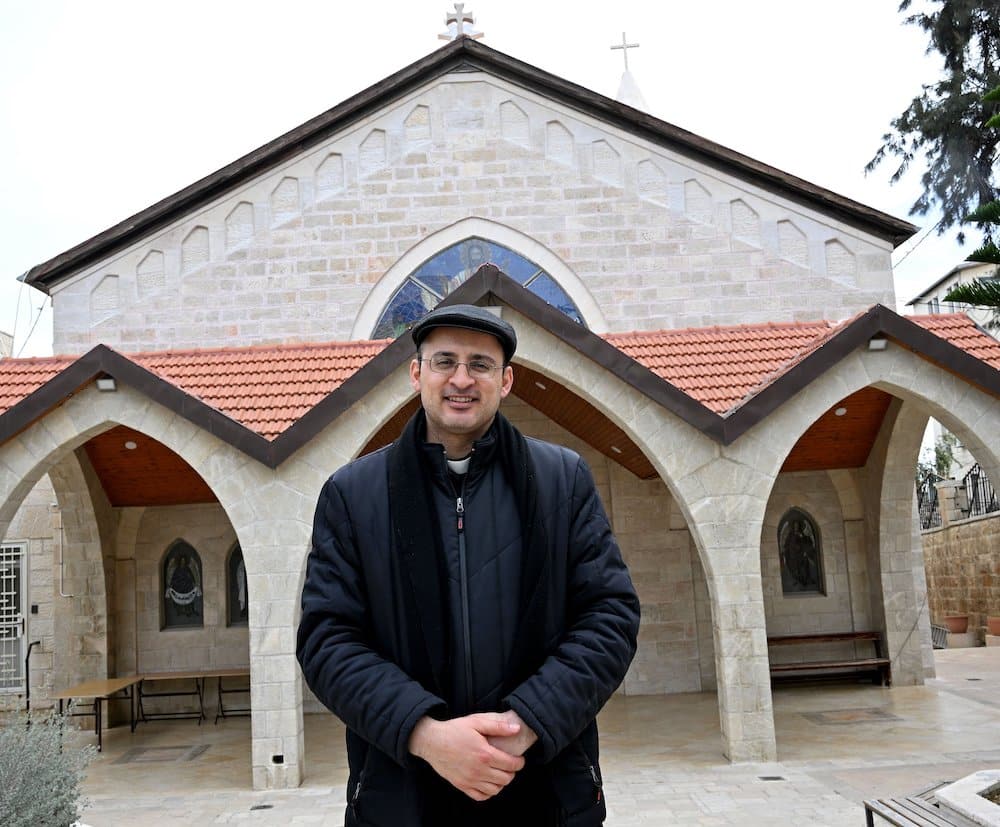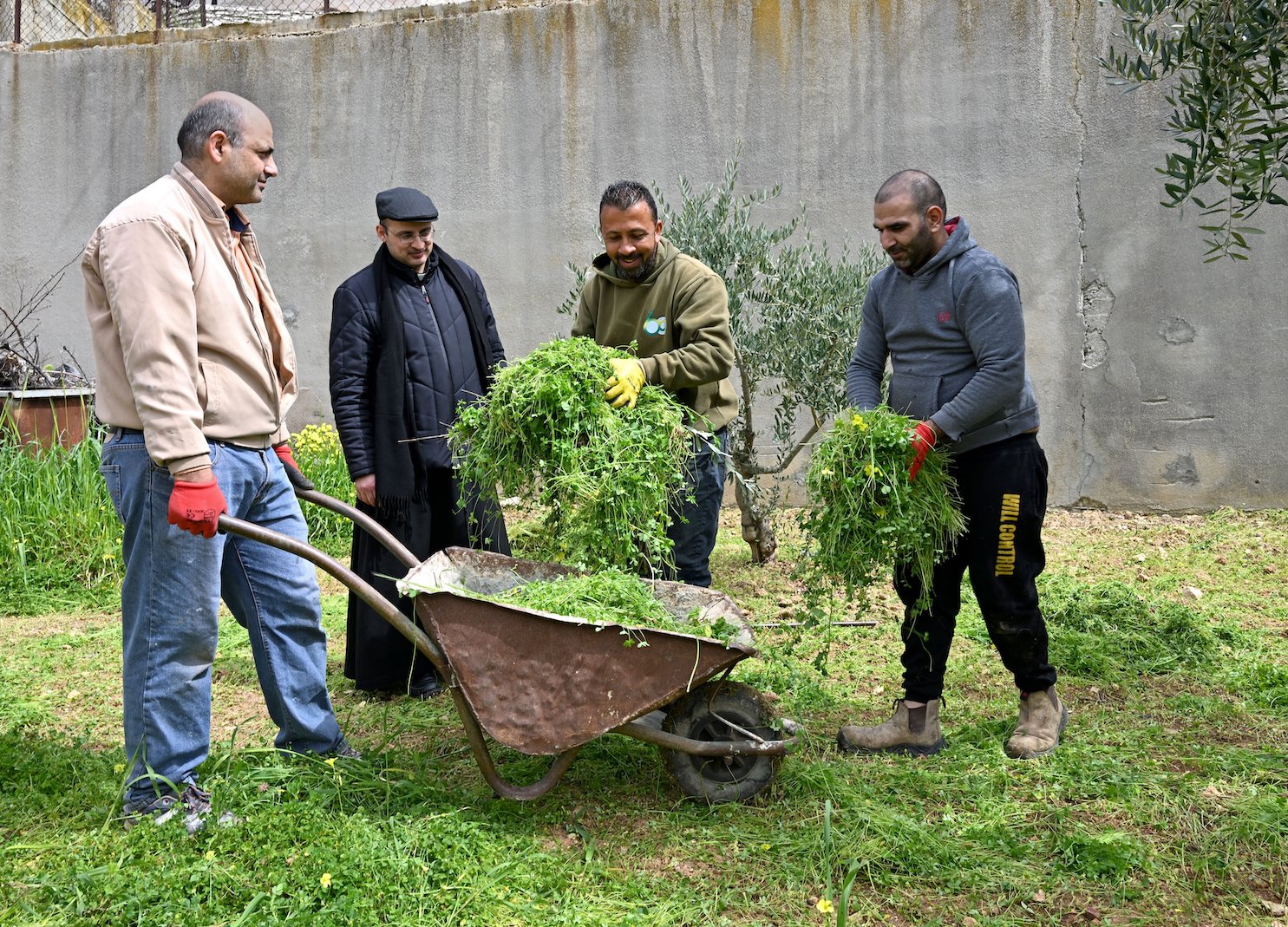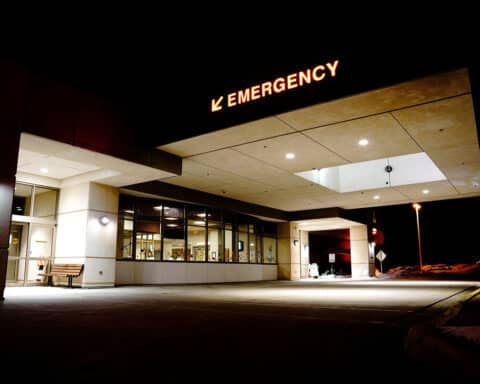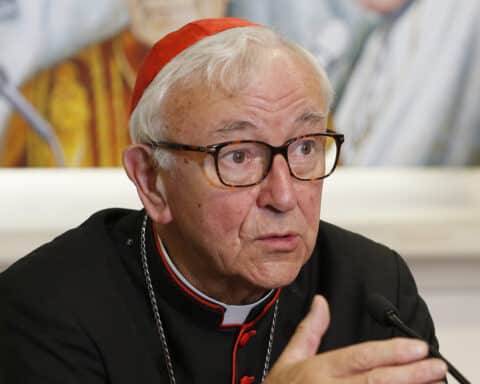BEIT SAHOUR, West Bank (OSV News) — Since the Oct. 7 Hamas attack on southern Israeli communities that left 1,200 dead and over 250 kidnapped, Lo’ay Ayyad, 48, a father of two and a successful veteran tour guide in the region, has been largely unemployed as the tourism industry has come to a halt and he has used up almost all his savings.
He is now among nearly 200,000 Palestinians in the West Bank and the Gaza Strip who have been out of work for five months. Citing security concerns, following the attack, Israel barred most Palestinian workers from entering Israel except for medical personnel and religious clergy.
Over 30,000 Palestinians have been killed in the ensuing war launched by Israel immediately following the unprecedented assault, according to the Hamas Health Ministry, which does not distinguish between Hamas members and civilians.
Ayyad can trace his family’s roots in Beit Sahour — where according to Christian tradition the shepherds first received the annunciation of Jesus’ birth — to the 17th century, and until now all his relatives — except for one aunt — have remained here. Ayyad has no intention of his teenage children, one who is in Cyprus studying AI engineering, being the first in the family to immigrate. To assure a future for them, he needs to work.
Projects funded by the Church
A labor-intensive project launched by the Latin Patriarchate, which supports work projects in the parish churches and community, has allowed Ayyad and other local Christians who have lost their permits to work in Israel to work and earn money to help support their families. The Palestinian Authority does not provide them financial assistance.
Working directly with all the parish priests in the West Bank, the project, now in its second phase, includes renovating parish buildings and gardens, cleaning up cemeteries, remodeling school and parish halls, and also helping in the upkeep of convents and private homes of parish members. The first phase of the project was initiated in December.
“I had saved some money but it was running out, so I am willing to do anything to earn a living. It is not easy doing the physical work, I am not used to it, but I have no other option,” said Ayyad, as he took a break from clearing a small olive tree grove at the Rosary Sisters’ convent in Beit Sahour.
His wife owns a clothes store but people are not buying many new clothes now, he said.
“Before October 7 we were getting a lot of requests for guiding. October and November are usually the busiest tourism season for everybody. The hotels are overbooked and you can’t even find one room available.”
This second phase of the labor-intensive project has enabled him to provide work for 49 people in his parish and to undertake long-needed projects, said Father Issa Hijazin, the priest at Our Lady of Fatima Parish in Beit Sahour.
Dignity of work
So far the patriarchate has spent around $150,000 on these projects for the parishes and it is still approving new initiatives, said the patriarchate’s CEO, Sami El-Yousef. About $350,000 has been spent on smaller general repairs on parish churches, convents and parish priests’ homes and children’s playgrounds.
“For their dignity people prefer to work to earn their money and not to just be given money. When they come to me, they ask for work, not for money assistance,” said Father Hijazin. “It’s very important for them because it’s very hard for a man when he sees that he’s not able to help his family.”

Allowing people to earn a salary also avoids having friction over financial issues in families, he added.
The Latin Patriarchate helped with similar projects during the Second Intifada and the COVID-19 pandemic, he said.
“The times of war or crisis in this country are a time to build the parishes,” Father Hijazin said. “And the beautiful thing in this kind of work is that in the end, they will have a beautiful place for their kids when they come. They feel happy because they work in our parish, in our church where their kids come every day.”
Outside the church he proudly points out the community garden that has been revamped by the project workers, and the new corner where a space is being planned to offer the young people a separate area where they can hang out together, all providing a safe place for the parish community to gather in the afternoons. The parish hall has been renovated to high standards in gray hues, ceiling molding, marble flooring and recessed lighting.
Worry about the future
People are concerned about being able to have some money in the coming months and even into next year because they don’t know what the situation will be like, he said.
“The first thing they worry about is to have income for food, pay their bills and debts. So they need to work to assure their future. And we also need to prepare for Easter, and have new clothes for the kids,” Father Hijazin said.
In the December phase, he worked with the younger workers to provide them with work, now he is providing jobs for workers with families, he said.
Wissam Jarayseh, 49, previously the owner of a clothes factory that sold clothes to Israeli stores and then a worker in the laundry room of the St. George Hotel in Jerusalem, is now doing gardening work in the Rosary Sisters’ convent with Ayyad. It is important for the spirit and emotional health to be able to buy his sons new clothes for the holiday and give them a feeling of happiness on Easter, he said.
“Before, I had 50 employees, but for me it is not difficult to do this work to feed my family,” said Jarayseh, the father of two. “I work hard and I get paid a salary. I didn’t expect this situation to last so long, I thought maybe one or two months but now it is going on six months and maybe it will last a year. Thank God for Abouna Issa (Father Issa) for giving us the opportunity to work.”





